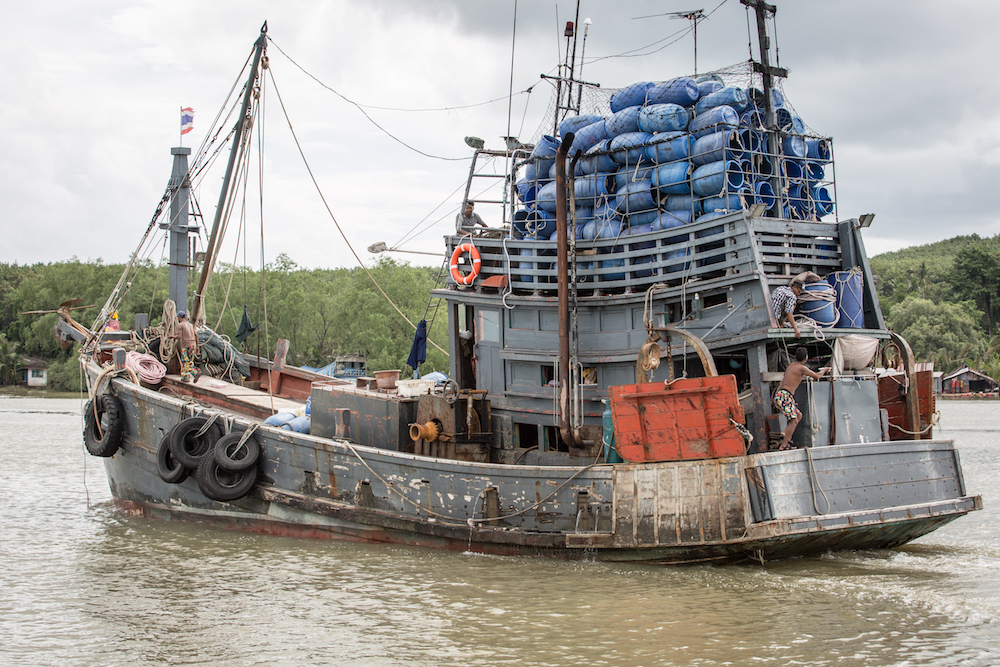
As EU lifts warning, EJF cautions that Thailand must continue action against illegal fishing and abuse at sea
The European Commission announced today that it will be lifting the ‘yellow card’ it placed on Thailand’s seafood industry. The Environmental Justice Foundation (EJF) has worked closely with the Royal Thai Government since 2015 on tackling illegal, unreported and unregulated fishing, and although there has been significant progress, important gaps remain, the organisation says.
The commission’s yellow card is a formal warning for the fishing industry that can lead to import bans to the EU. This is a serious issue in Thailand, where seafood exports run to millions of tonnes, and in 2016 alone were worth US$ 5.8 billion.
EJF notes that there have been significant and substantial improvements in Thailand’s monitoring, surveillance, and enforcement capabilities. On-the-ground investigations have shown good progress, including innovative efforts such as the use of covert patrol vessels to combat non-compliance among vessel operators and intercept illegal fishing boats.
In addition, Thailand has shown vitally important regional leadership in moving to become the first country in Asia to ratify the Work in Fishing Convention C188, which sets basic standards of decent work in the fishing industry. This bold step is to be applauded and we note it is vital that ratification of the convention proceeds as planned at the end of January.
However, EJF has also found lingering shortcomings that prevent Thailand’s fishing industry from becoming truly ethical and sustainable.
Following a meeting with Thailand’s Deputy Prime Ministers Prawit Wongsuwan and Chatchai Sarikulya in September 2018, Steve Trent, Executive Director of EJF, said:
“Thailand has made significant progress in ensuring that fishing vessels are compliant with new fisheries legislation through the use of monitoring technologies, inspection regimes, and undercover enforcement efforts. The country must now implement measures that will drive home this change to showcase Thailand as a regional and international leader in sustainable fisheries management.”
Addressing the over-capacity of the Thai fishing fleet is paramount to stabilising fish stocks. EJF commends recent progress in identifying fishing vessels that could be phased out, however, it is crucial that the Royal Thai Government commits to a time-bound vessel decommissioning programme.
The ‘Port in Port out’ (PIPO) network has the potential to be a powerful tool to combat both illegal fishing and associated labour abuses. All fishing vessels above 30 gross tonnes must report to their local PIPO centre before and after every fishing trip, for inspections by the authorities. However, EJF has observed some worrying shortcomings in the inspections, such as failure to provide consistent translation services for migrant crew, meaning they may be unable to give effective evidence in interviews.
Without the threat of sanctions from the EU, strong political will is needed to entrench the positive progress already made and ensure its long-term success. This would help establish the country as a regional and international leader in ethical seafood production. EJF remains committed to working closely with the Royal Thai Government to bring about these reforms and preserve existing reforms as quickly and as thoroughly as possible.
“EJF also praises the outstanding leadership of the European Commission in combatting illegal fishing in Thailand and across the world. Without the extensive, bold and progressive efforts initiated by the EU Commission and a small dedicated team there, much and possibly most of the progress we have seen in addressing highly damaging illegal, unreported and unregulated fishing would not have been realised. Europe can be rightly proud of the leadership it has shown,” concluded Trent.
Notes for the editor:
Watch EJF’s investigative film Thailand’s Seafood Slaves and read the report
Images available on request
- -EJF has worked in Thailand since 2013 with initial investigations into the shrimp and trash fish industries. Close collaboration with the Royal Thai Government now encompasses work across several agencies including Department of Fisheries, Command Centre for Combatting Illegal Fishing, Ministry of Labour, Department of Labour Protection and Welfare, and Marine Department.
- -There are an estimated 4.5 million migrant workers in Thailand with 222,000 workers in the seafood processing sector and approximately 129,000 workers on-board fishing vessels (Thai Ministy of Labour). These workers represent a significant portion of Thailand’s workforce and are operating in one of the most dangerous professions in the world yet are still not granted the same rights as Thai domestic workers.
- -Thai seafood exports of 1.4 million tonnes in 2016 were worth $5.8 billion (UN Comtrade).
- -Catch per unit effort – a measure of how productive or depleted a fishery is – dropped by 94% in the Gulf of Thailand between 1961 and 2016 and by 69% in the Andaman Sea between 1966 and 2016.
- -Thailand has a fleet of a proximately 11,000 commercial fishing vessels (Department of Fisheries, January 2018).
- -Thailand’s PIPO network numbers 32 centres across Thailand’s 22 coastal provinces. There are a further 19 Forward Inspection Points which help share the workload of the main PIPO centres.
- -Steve Trent – EJF’s Executive Director – met with Deputy Prime Minister Prawit Wongsuwan and Deputy Prime Minister Chatchai Sarikulya in March 2018. During the week Steve also met with the Minister of Labour – Police General Adul Saengsingkaew, Minister of Agriculture and Cooperatives – Minister Grisada Boonrach, the Director General of the Department of Fisheries – Dr. Adisorn Promthep, and Deputy Permanent Secretary of Ministry of Foreign Affairs – Mr. Thanee Tongpakdee.
The Environmental Justice Foundation is an international non-governmental organisation working to protect the environment and defend human rights. EJF is a charity registered in England and Wales (1088128). www.ejfoundation.org
Contacts:
Daisy Brickhill - EJF Press & Communications Coordinator
daisy.brickhill@ejfoundation.org
Tel: +44 7871 946 911
